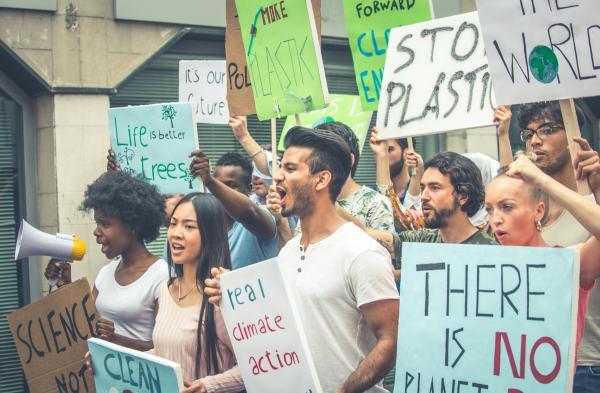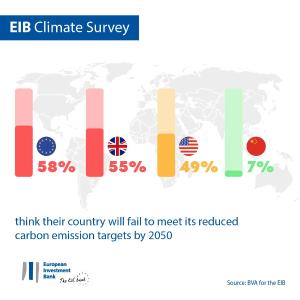
The first release of the 2021-2022 EIB Climate Survey explores people’s views on climate change in a rapidly changing world. The results from this release focus on citizens’ perceptions of climate change, and the actions they expect their country to take to combat it.
- 91% of Italian respondents feel that climate change has an impact on their everyday lives
- 88% believe that tackling climate change and its consequences is the biggest challenge of the 21st century
- 86% of Italians believe they are more concerned about the climate emergency than their government
- 81% are in favour of stricter government measures that impose changes on people’s behaviour
- 72% would welcome a tax on products and services that contribute most to global warming
- 55% think their country will fail to drastically reduce its carbon emissions by 2050
88% of Italians believe that tackling climate change and its consequences is the biggest challenge of the 21st century – seven points above the EU average of 81%. Regardless of age group or political views, at least 79% of the Italian population consider climate change and its consequences as the biggest challenge of the century.
Italians are now feeling the impact of climate change in their daily lives far more than other Europeans do (91% vs. 77%).
Italian people sceptical of their government's ability to fight climate change
86% of Italians believe that they are more concerned about the climate emergency than their government. This figure is 11 points higher than the European average (75%) and increases by six points for those who have left-leaning political views (92%). More than in the rest of Europe (51%), Italians (57%) believe that their government is not active enough to trigger behavioural changes amongst businesses and individuals. Consequently, only a minority (45%) believe that Italy will succeed in reducing its carbon emissions drastically by 2050, as pledged in the Paris Agreement.
81% of Italians are in favour of stricter government measures – similar to the ones implemented to combat the COVID-19 crisis – that impose changes on people’s behaviour to fight climate change (one point higher than last year).
The energy debate
A significant majority of Italian respondents think their country should rely more on renewable energies (73%) to tackle the climate crisis, a sentiment that is shared less by Europeans as a whole (63%). Italians with left-leaning political views support renewables more strongly than those with right-leaning political views (80% compared to 68%), a difference of 12 points.
Italians rank nuclear energy (6%, six points below the European average of 12%) and natural gas (6%, similar to the European average) far below renewables as the energy source to be developed further to address climate change.
Instead of prioritising nuclear energy or natural gas, 13% of Italians (10% of men and 16% of women) would favour energy savings.
Most popular solutions to fight climate change among Italians
Italians largely support (72%) the introduction of a tax on products and services that contribute most to global warming, even more so than Europeans in general (69%). They are also in favour of a 5-year minimum warranty on any electric or electronic product (91%) and replacing short-distance flights with fast, low-emission trains (87%). They would also support softer measures like strengthening education and increasing youth awareness of sustainable consumption (93%).
EIB Vice-President Ambroise Fayolle said: “Italians are requesting stricter measures and tools from public authorities in order to help them combat climate change. In the run-up to COP26, these demands from the public are a clear mandate for us to strengthen our efforts and accelerate the green transition. As the EU climate bank, the EIB’s role is to finance projects that focus on clean energy, energy savings, sustainable mobility solutions and innovations that will help limit the rise in temperature to 1.5°C or less.”
“As shown by the latest edition of the EIB Climate Survey, citizens are asking for bolder action to tackle the climate crisis. 88% of Italian respondents believe that tackling climate change and its consequences is the biggest challenge of the 21st century, and they are right. This decade will be critical to addressing our planet’s climate emergency. We must support the development and deployment of disruptive technologies, and developing countries must be given access to them. As one of the world’s main financiers of climate action, the EIB is committed to working side-by-side with governments and cities to support the implementation of the European Green Deal and help Europe become the first carbon-neutral continent by 2050. We must ensure that the recovery from the pandemic is green,” said EIB Vice-President Gelsomina Vigliotti.
Download the Excel spreadsheet with the raw data for all 30 countries surveyed here. Please click here to access the EIB website page that presents key findings of the EIB Climate Survey IV.
About the EIB Climate Survey
The European Investment Bank has launched the fourth edition of the EIB Climate Survey, a thorough assessment of how people feel about climate change. Conducted in partnership with market research firm BVA, the fourth edition of the EIB Climate Survey aims to inform the broader debate on attitudes and expectations in terms of climate action. More than 30 000 respondents participated in the survey between 26 August and 22 September 2021, with a representative panel for each of the 30 countries polled.
About the European Investment Bank
The European Investment Bank is active in around 160 countries and is one of the world’s largest multilateral lenders for climate action projects. The EIB Group has recently adopted its Climate Bank Roadmap to deliver on its ambitious agenda to support €1 trillion of climate action and environmental sustainability investments in the decade to 2030 and to deliver more than 50% of EIB finance for climate action and environmental sustainability by 2025. As part of the Roadmap, all new EIB Group operations have also been aligned with the goals and principles of the Paris Agreement since the start of 2021.
About BVA
BVA is an opinion research and consulting firm recognised as one of the most innovative market research firms in its sector. Specialised in behavioural marketing, BVA combines data science and social science to make data inspiring and bring it to life. BVA is also a member of the Worldwide Independent Network of Market Research (WIN), a global network of some of the world’s leading market research and survey players, with over 40 members.

Photographer: EIB ©EIB
Download original

Photographer: EIB ©EIB
Download original

Photographer: EIB ©EIB
Download original

Photographer: EIB ©EIB
Download original

Photographer: EIB ©EIB
Download original